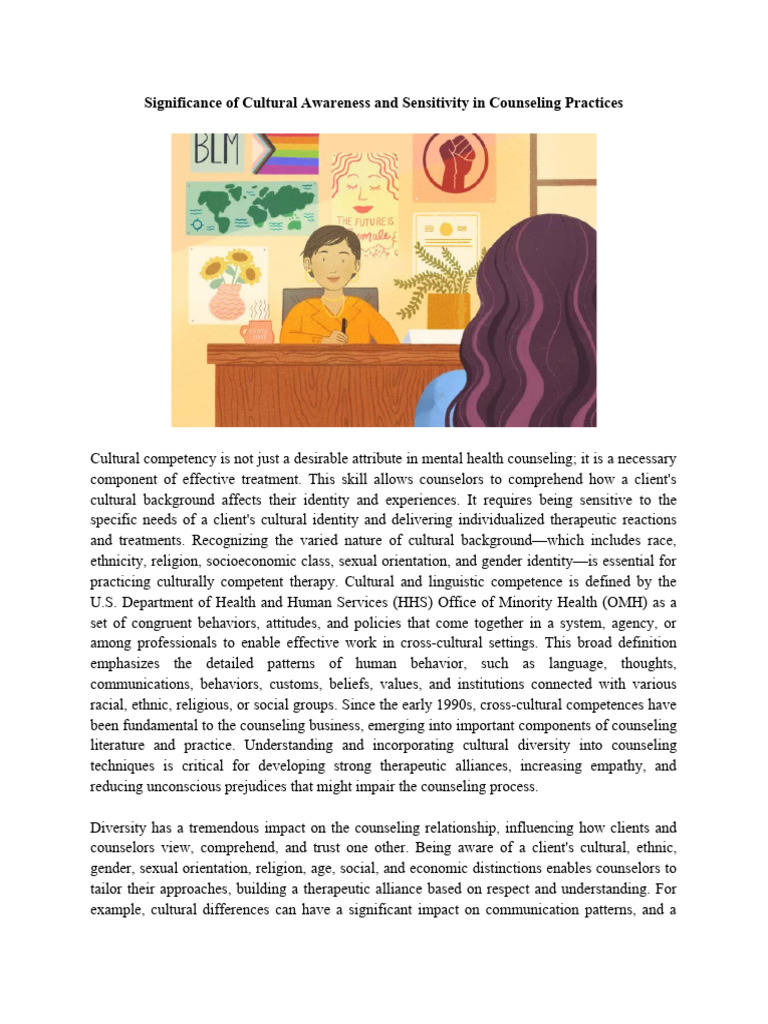In the realm of mental health and counseling, cultural knowledge emerges as a quintessential component that significantly influences therapeutic outcomes. The crescendo of globalization has engendered a diverse tapestry of cultural identities, necessitating an acute awareness and sensitivity towards the multifaceted experiences of clients. This discourse elucidates the paramount significance of cultural knowledge in counseling, underlining its impact on client relationships, therapeutic efficacy, and ethical practice.
At its core, cultural knowledge encompasses an understanding of the varied belief systems, values, and practices that shape individual experiences. It transcends mere awareness; it demands introspection and a commitment to recognizing the intrinsic social determinants that influence mental health. Cultural differences can manifest in myriad forms, including but not limited to ethnicity, race, religion, gender identity, socioeconomic status, and even geographical background. Each of these factors interplays with an individual’s worldview, thereby shaping their experiences and responses to counseling. For instance, collectivist cultures may prioritize familial involvement in therapeutic processes, while individualistic cultures may advocate for personal autonomy in decision-making.
An observation frequently noted in counseling contexts is the phenomenon of miscommunication stemming from cultural disparities. Language barriers, varied expressions of distress, and differing expectations of the counseling process can create a chasm between counselor and client. Often, clients may exhibit behaviors or verbalize sentiments that may be misinterpreted without a contextual understanding. For instance, a client from a culture where emotional restraint is valued might appear withdrawn or disengaged to a therapist unacquainted with these cultural nuances. Thus, the lack of cultural knowledge can perpetuate misunderstandings, eroding the foundation of a therapeutic alliance.
Delving deeper into this subject, the underpinnings of fascination with cultural knowledge in counseling can be attributed to the intricate interplay between identity and mental health. Cultural identity forms the bedrock of individuals’ self-perception and their interactions with the world. The salience of cultural context cannot be overstated; it invariably informs how individuals articulate their difficulties. Acknowledging and respecting these cultural identities fosters an environment conducive to open communication and rapport-building, essential for effective therapy. A deeper engagement with cultural narratives can unveil the motivations and aspirations that underlie a client’s presenting issues.
Moreover, the therapeutic landscape necessitates an understanding of acculturation and its psychological implications. Clients frequently navigate the complexities of biculturalism, experiencing the often conflicting demands of multiple cultural identities. Counselors equipped with cultural knowledge can offer more nuanced insights and interventions that validate the client’s experiences. Such an approach acknowledges both the challenges and strengths derived from belonging to multiple cultural spheres, fostering resilience and promoting adaptive coping mechanisms.
The ethical dimensions of counseling practice also underscore the necessity for cultural knowledge. Counselors are mandated to approach their practice with cultural humility—an acknowledgment of the limitations of their cultural perspective and a commitment to ongoing education. This ethical obligation extends to recognizing power dynamics inherent in counselor-client relationships, particularly when there is a perceived cultural dissonance. The pursuit of cultural competence involves understanding one’s biases, actively seeking knowledge about diverse cultures, and implementing this learning to enhance therapeutic practice.
As the dialogue on cultural knowledge in counseling continues to evolve, so too does the imperative for systematic integration of cultural competency training within mental health education. Academic programs must prioritize curricula that encompass a comprehensive exploration of cultural frameworks, empowering future counselors with the tools required to navigate this complex terrain. This investment in education not only benefits counselors but also the broader community, as culturally competent practice ultimately yields better mental health outcomes across diverse populations.
A critical factor in establishing a culturally aware counseling practice is the incorporation of community resources and collaborations. Engaging with cultural organizations, community leaders, and support networks enhances the counselor’s understanding and respect for the cultural context of their clients. Such collaborations also provide avenues for clients to connect with culturally relevant support, fostering a holistic approach to mental health care. These partnerships not only enrich the therapeutic process but also validate clients’ cultural identities, which is indispensable in their healing journey.
Furthermore, technology has emerged as a double-edged sword in the context of cultural knowledge in counseling. While innovations like teletherapy facilitate access to mental health services for diverse populations, they also pose challenges related to cultural representation and sensitivity. It becomes imperative for counselors to remain vigilant about the potential for cultural erasure or misrepresentation in digital spaces. An ongoing dialogue about the intersection of technology and cultural competence will help to ensure that all clients receive equitable care, regardless of their cultural backgrounds.
In conclusion, cultural knowledge in counseling is not merely an ancillary consideration; it is integral to the practice of effective, ethical, and compassionate therapy. By embracing the complexities of cultural identity, recognizing the implications of acculturation, and committing to continuous learning, counselors can cultivate a practice that not only respects but celebrates the rich diversity of human experiences. In this multifaceted landscape, the shared humanity remains a beacon, guiding counselors toward understanding and supporting their clients more effectively. The imperative is clear: cultural knowledge is a pathway to enriched therapeutic alliances and transformative mental health practices.
